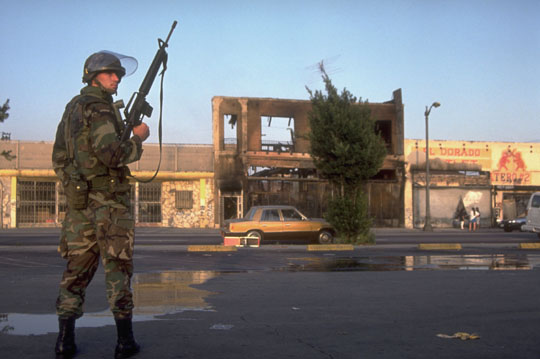Camila Martinez-Granata
Staff Writer
Photo from Wikipedia
The Rodney King beating of 1991 and the Los Angeles Riots of 1992 is still being remembered 20 years later. The country witnessed what seemed to be a resurrection of the civil rights movement, but is there more to the picture? Should Rodney King be the poster child that speaks to racism in the 90s?
It is tacitly accepted that the racial tensions in South Central Los Angeles made the headlines for days and is most commonly associated with the reason for the riots. We look at the shootings of Oscar Grant and Trayvon Martin, appalled that such a thing could occur. But we’ve seen this before- how is this any different? Have we moved forward as a country?
The Los Angeles Riots did not occur in sole response to the beating of Rodney King, but to a long history of economic disparity, worsening poverty conditions and lack of public services- significantly worse in South Central Los Angeles. Moreover, this neighborhood comprised of large immigrant and racial groups who already had preexisting social disputes or alienation towards others. Crime was high, the explosion of crack cocaine ensued the streets of South Central and educational services there sucked.
The urban decay of inner cities in Los Angeles had been a long existing condition, and Rodney King gave the people the catalyst they were waiting for. The so-called crusade for civil rights, in some ways, seemed to be used as an excuse to express satisfaction- in a violent and anarchic way.
I am not saying that the beating of King was irrelevant or did not strike the heart-strings of pro-civil rights individuals. But I do think that King’s incident was a separate issue of its own that was quickly adopted by the people of Los Angeles as a reason to protest and riot. As a side note, the day King was attacked by officers didn’t just come out of the blue. He was being chased by Los Angeles Police Department and California Highway Patrol for speeding. King refused to stop because he knew he would be violating his parole for a previous robbery conviction.
Again, let me remind you that I am not saying King deserved it or had it coming- he didn’t, and when that happens to someone, they never deserve it. What I am saying, is that people take events and distort them into meaning something else, or tossing it into the melting pot of whatever issue. The shooting of Trayvon Martin has gained national attention recently, even though it occurred several months ago. Why did it take so long for people to become so passionate about such a tragic and unjust event?
The media has an uncanny ability to exploit and deform the events of such injustices in what I would call a positive light. Of course racism and people with superiority complexes should be punished for their crimes, but media has made it out to be the end of humanity or Armageddon. But what bothers me about such publicity it that it is over exaggerated. People are always so surprised when this happens, and they immediately attribute racism to be the underlying issue of such things. That is irresponsible and naive to simply assume that an event like that was because of one big issue. And it is- racism has still figured out how to jump through legal loopholes, allowing police officers to do things we made illegal years ago.
What about all that economic disparity, lack of social services, and pure poverty in urban neighborhoods? When was any of that resolved? When did the very people rioting finally win what they had been fighting for? Sure, King got about $2 million by the end of the whole ordeal. But did every other Mexican, African-American, Korean or Caucasian receive any sort of reparation for their losses?
You’re damn right King received his justice, even though Oscar Grant and Trayvon Martin have yet their vindication to come. But our ever-growing media hides, obstructs and blurs the true reasons why some of these things occur, and disregards the essence and truth of what something really is. Viewer discretion is advised.











